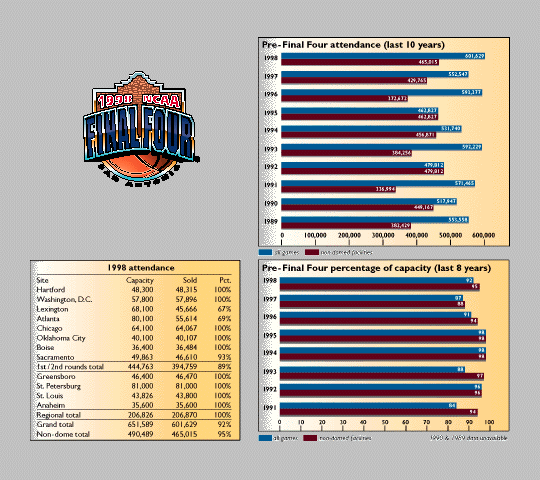
National Collegiate Athletic Association |
The NCAA News DigestApril 6, 1998
Not only was attendance for the pre-Final Four rounds of the 1998 Division I Men's Basketball Championship the most ever, the event also was notable for a high percentage of capacity, given that two domed stadium facilities were used. For the first and second rounds and the regionals of the 1998 event, 92 percent of the seats were filled (total attendance of 601,629), even though the South regional and a set of first- and second- round games were conducted in domed facilities that have far more seats to fill than conventional arenas. The attendance pattern was much like 1996, when attendance was high at three domed pre-Final Four tournament sites (Indianapolis, Minneapolis and Atlanta).
LITIGATIONRestricted-earnings damages phase set to begin April 6 The damages phase of the lawsuit involving the NCAA's restricted-earnings coach legislation is scheduled to begin April 6 in U.S. District Court in Kansas City, Kansas. An appeals court has upheld a district court ruling that the NCAA acted in violation of federal antitrust laws by capping the earnings on compensation for certain entry-level coaches. The NCAA asked the appeals court for an en banc hearing by all the judges of the appeals court, but the court denied the request. The NCAA and the plaintiffs in the case are continuing to participate in a mediation process on the damages. Staff contact: Elsa Cole.
FEDERAL LEGISLATIONAmendments would require schools to predict sports cuts Two pieces of federal legislation currently being considered by the House and Senate may restrict institutions' decisions regarding sports sponsorship. The House Education and the Workforce Committee adopted an amendment to the Equity in Disclosure Act March 18 that would require all higher education institutions to predict what sports they may want to reduce or delete, four years in advance. The Senate Labor and Human Resources Committee is considering adopting the House amendment or another amendment that is even more restrictive. The more restrictive amendment would require institutions to inform affected student-athletes of any decision the institution makes regarding elimination or reduction of sports teams, and it also would set a process for appealing that decision through campus procedures or federal district court. NCAA Executive Director Cedric W. Dempsey cautioned in a March 27 letter to the Senate committee that the legislation is inappropriate and unprecedented. Member institutions wishing to express an opinion regarding the legislation can contact members of the Senate Labor and Human Resources Committee. Staff contact: Doris A. Dixon.
STATE LEGISLATIONAlabama, South Dakota enact bills involving agents, trainer Two states have enacted legislation with implications for intercollegiate athletics. In Alabama, additional provisions were added to the existing state athlete-agent law, including a provision imposing criminal penalties on a student-athlete and/or an athlete agent if notification is not provided to the athletics director or university president upon entering into an oral or written agent contract or upon the student-athlete's receipt of an in-kind benefit from an athlete agent. In South Dakota, legislation granting a temporary permit to an athletic trainer who has completed the state's educational requirements was signed into law. State legislatures around the country also currently are considering legislation involving athletics facilities, course grades disclosure and high-school extracurricular activities. Staff contact: Daniel A. Nestel.
FINANCESRequest for revenue-distribution information sent to membership Directors of athletics at all Division I institutions have been sent a package designed to acquire information or verify existing information pertaining to sports sponsorship, grants-in-aid and Pell Grants. The information is to be used in determining allocations for this year's revenue-distribution plan. Responses are due at the national office by May 8. Staff contact: Keith E. Martin.
|
